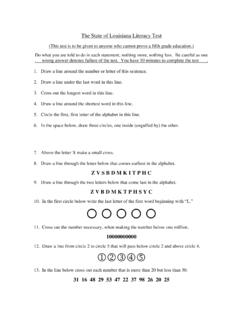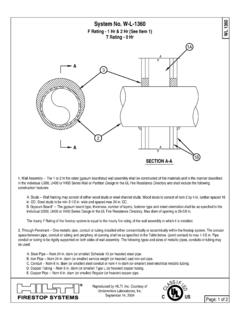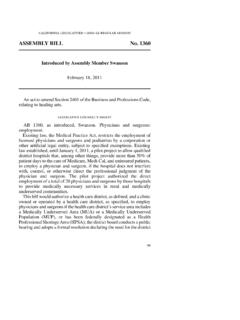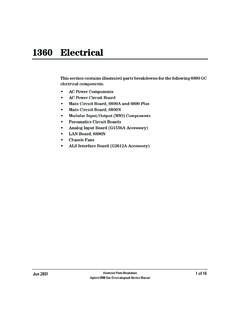Transcription of Uniform Rules of Procedure for Hearing Contested Cases ...
1 June, 2004 (Revised) 1 Rules OF TENNESSEE DEPARTMENT OF STATE ADMINISTRATIVE PROCEDURES DIVISION CHAPTER 1360-04-01 Uniform Rules OF Procedure FOR Hearing Contested Cases BEFORE STATE ADMINISTRATIVE AGENCIES TABLE OF CONTENTS Scope Intervention Definitions Subpoena Filing and Service of Pleadings and Other Order of Proceedings Materials Default and Uncontested Proceedings Time Evidence in Hearings Commencement of Contested Case Clerical Mistakes Proceedings Petitions for Reconsideration and Stays to Service of Notice of Hearing Multi-Member Agencies Declaratory Orders Filing of Final Orders Representation by Counsel Code of Judicial Conduct Prehearing Motions Continuances Discovery SCOPE. (1) Subject to any superseding federal or state law, these Rules shall govern Contested case proceedings before all agencies that have adopted these Rules , and will be relied upon by administrative judges in all Contested Cases utilizing administrative judges from the Administrative Procedures Division of the Office of the Secretary of State (whether sitting alone or with the agency), except where an agency has lawfully adopted a rule pursuant to 4-5-219 (d) that is contrary to any provision to these Rules .
2 However, rule applies to all administrative judges and Hearing officers of the state of Tennessee. (2) Any provision of these Rules may be suspended where clearly warranted in the interest of justice. (3) In any situation that arises that is not specifically addressed by these Rules , reference may be made to the Tennessee Rules of Civil Procedure for guidance as to the proper Procedure to follow, where appropriate and to whatever extent will best serve the interests of justice and the speedy and inexpensive determination of the matter at hand. (4) Agencies are encouraged to adopt their own Rules of Procedure to address specific topics that are unique to the type of Cases conducted by an agency, to whatever extent these Rules do not address such topics. Authority: 4-5-219 and 4-5-321. Administrative History: Original rule filed November 22, 1978; effective January 8, 1979. Amendment filed May 23, 1984; effective June 22, 1984.
3 Repeal and new rule filed November 25, 1986; effective January 9, 1987. Amendment filed May 31, 1990; effective July 15, 1990. DEFINITIONS. (1) Pleadings - Pleadings are written statements of the facts and law which constitute a party s position or point of view in a Contested case and which, when taken together with the other party s pleadings, will define the issues to be decided in the case. Pleadings may be in legal form - as for example, a Notice of Hearing and Charges , Petition for Hearing or Answer Uniform Rules OF Procedure FOR Hearing Contested CHAPTER 1360-04-01 Cases BEFORE STATE ADMINISTRATIVE AGENCIES (Rule , continued) June, 2004 (Revised) 2- or, where not practicable to put them in legal form, letters or other papers may serve as pleadings in a Contested case, if necessary to define what the parties positions are and what the issues in the case will be. (2) Filing - Unless otherwise provided by law or by these Rules , filing means actual receipt by the entity designated to receive the required materials.
4 (3) Petitioner - The petitioner in a Contested case proceeding is the moving party, , the party who has initiated the proceedings. The petitioner usually bears the ultimate burden of proof and will therefore present his or her proof first at the Hearing . In some Cases , however, the party who initiated the proceedings will not be the party with the burden of proof on all issues. In such Cases , the administrative judge will determine the order of proceedings, taking into account the interests of fairness, simplicity, and the speedy and inexpensive determination of the matter at hand. The petitioner is usually a state agency or department. (4) Respondent - The respondent in a Contested case proceeding is the party who is responding to the charges or other action brought by the petitioner . (5) Administrative Judge - Wherever the term administrative judge is used in these Rules , it is intended to include reference to the term Hearing officer, in Cases in which Hearing officers conduct the proceedings.
5 (6) Administrative Procedures Division - The Administrative Procedures Division of the Office of the Secretary of State, 312 8th Floor, William R. Snodgrass Tower, Nashville, Tennessee 37243; Telephone (615) 741-7008. (7) Burden of Proof - The burden of proof discussed in the definition of petitioner above refers to the duty of a party to present evidence on and to show, by a preponderance of the evidence, that an allegation is true or that an issue should be resolved in favor of that party. A preponderance of the evidence means the greater weight of the evidence or that, according to the evidence, the conclusion sought by the party with the burden of proof is the more probable conclusion. The burden of proof is generally assigned to the party who seeks to change the present state of affairs with regard to any issue. The administrative judge makes all decisions regarding which party has the burden of proof on any issue.
6 Authority: 4-5-219, 4-5-301(b), and 4-5-312; Cross reference 4-5-102. Administrative History: Original rule filed November 22, 1978; effective January 8, 1979. Amendment filed May 23, 1984; effective June 22, 1984. Repeal and new rule filed November 25, 1986; effective January 9, 1987. Amendment filed May 31, 1990; effective July 15, 1990. FILING AND SERVICE OF PLEADINGS AND OTHER MATERIALS. (1) All pleadings, petitions for review, and any other materials required to be filed with an agency or the Administrative Procedures Division by a time certain shall be filed by delivering such materials in person or in any other manner, including by mail, so long as they are actually received by the Administrative Procedures Division or the agency within the required time period. (2) Once the Administrative Procedures Division has become involved in any Contested case proceeding, all pleadings and other materials required to be filed or submitted prior to the Hearing of a Contested case shall be filed with the Administrative Procedures Division, where they will be stamped with the date and hour of their receipt.
7 Petitions for agency review of an initial order and for agency reconsideration or stay of a final order may be filed with either the agency or the Administrative Procedures Division and should preferably be filed with both. Uniform Rules OF Procedure FOR Hearing Contested CHAPTER 1360-04-01 Cases BEFORE STATE ADMINISTRATIVE AGENCIES (Rule , continued) June, 2004 (Revised) 3 Whenever an agency or the Administrative Procedures Division receives any such petition, it shall forward a copy to the other. (3) Discovery materials that are not actually introduced as evidence need not be filed, except as provided at rule (3). (4) Copies of any and all materials filed with the agency or Administrative Procedures Division in a Contested case shall also be served upon all parties, or upon their counsel, once counsel has made an appearance. Any such material shall contain a statement indicating that copies have been served upon all parties. Service may be by mail or by hand delivery.
8 Authority: 4-5-219. Administrative History: Original rule filed November 22, 1978; effective January 8, 1979. Amendment filed May 23, 1984; effective June 22, 1984. Repeal and new rule filed November 25, 1986; effective January 9, 1987. Amendment filed May 31, 1990; effective July 15, 1990. TIME. (1) In computing any period of time prescribed or allowed by statute, rule, or order, the date of the act, event or default after which the designated period of time begins to run is not to be included. The last day of the period so computed is to be included unless it is a Saturday, a Sunday or a legal holiday, in which event the period runs until the end of the next day which is neither a Saturday, a Sunday nor a legal holiday. When the period of time prescribed or allowed is less than seven days, intermediate Saturdays, Sundays and legal holidays shall be excluded in the computation. (2) Except in regard to petitions for review under 4-5-315, 4-5-317, and 4-5-322, or where otherwise prohibited by law, when an act is required or allowed to be done at or within a specified time, the agency or the administrative judge may, at any time, (a) with or without motion or notice order the period enlarged if the request is made before the expiration of the period originally prescribed or as extended by previous order, or (b) upon motion made after the expiration of the specified period, permit the act to be done late, where the failure to act was the result of excusable neglect.
9 Nothing in this section shall be construed to allow any ex parte communications concerning any issue in the proceeding that would be prohibited by 4-5-304. Authority: 4-5-219. Administrative History: Original rule filed November 22, 1978; effective January 8, 1979. Amendment filed May 23, 1984; effective June 22, 1984. Repeal and new rule filed November 25, 1986; effective January 9, 1987. COMMENCEMENT OF Contested CASE PROCEEDINGS. (1) Commencement of Action. A Contested case proceeding may be commenced by original agency or public action, by appeal of a person from an agency action, by request for Hearing by an affected person, or by any other lawful Procedure . (2) Notice of Hearing . In every Contested case, a notice of Hearing shall be issued by the agency, which notice shall comply with 4-5-307 (b). (3) Supplemented Notice. In the event it is impractical or impossible to include in one document every element required for notice, elements such as time and place of Hearing may be supplemented in later writings.
10 In certain Cases , such as those brought before the Civil Service Commission, some requirements of this subsection may be satisfied during the course of prehearing conferences. Uniform Rules OF Procedure FOR Hearing Contested CHAPTER 1360-04-01 Cases BEFORE STATE ADMINISTRATIVE AGENCIES (Rule , continued) June, 2004 (Revised) 4(4) Filing of Documents. When a Contested case is commenced in which an administrative judge from the Administrative Procedures Division will be conducting the proceedings, the agency shall provide the Administrative Procedures Division with all the papers that make up the notice of Hearing and with all pleadings, motions, and objections, formal or otherwise, that have been provided to or generated by the agency. Legible copies may be filed in lieu of originals. (5) Answer. The party may respond to the charges set out in the notice or other original pleading by filing a written answer with the Agency in which the party may: (a) Object to the notice upon the ground that it does not state acts or omissions upon which the Agency may proceed.












